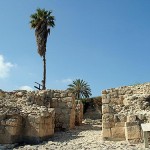The City Gates and Other Community Gatherings

As I explained in my post “The Church, the Synagogue, and the City Gates,” at least one scholar has concluded that the Jewish synagogue finds its origin in the community activities related to the “city gates” instead of the worship activities related to the temple. Since the early followers of Jesus Christ were greatly influenced by their experiences as part of the first century synagogue, understanding how the synagogue began and what types of activities happened as part of the synagogue can help us also understand the early church.
The gates of various cities are mentioned many times in Scripture. Often, people are said to pass into or out of the gates. Thus, the gates simply represent access to a city. In other passages, gates are said to be barred or fortified, representing the protection or defense of the city. Also, I’ve looked at a few passages in which the king sat on his throne at the gates of the city and other passages in which elders of the community sat at the city gates. I also looked at community legal issues which were associated with the city gates. In this post, I look at examples of other community gatherings in the city gates.
So far, each of the examples have shown some type of community gathering in the city gates. Here are some examples of other community gatherings in the gates that don’t fall into the other categories (king, elders, legal issues):
As soon as he mentioned the ark of God, Eli fell over backward from his seat by the side of the gate, and his neck was broken and he died, for the man was old and heavy. He had judged Israel forty years. (1 Samuel 4:18 ESV)
Then Saul approached Samuel in the gate and said, “Tell me where is the house of the seer?” (1 Samuel 9:18 ESV)
And Absalom used to rise early and stand beside the way of the gate. And when any man had a dispute to come before the king for judgment, Absalom would call to him and say, “From what city are you?” And when he said, “Your servant is of such and such a tribe in Israel,” Absalom would say to him, “See, your claims are good and right, but there is no man designated by the king to hear you.” Then Absalom would say, “Oh that I were judge in the land! Then every man with a dispute or cause might come to me, and I would give him justice.” (2 Samuel 15:2-4 ESV)
When I went out to the gate of the city,
when I prepared my seat in the square,
the young men saw me and withdrew,
and the aged rose and stood;
the princes refrained from talking
and laid their hand on their mouth;
the voice of the nobles was hushed,
and their tongue stuck to the roof of their mouth. (Job 29:7-10 ESV)
There are many other passages which mention the gates of various cities in many different cultures. Many of these are related to the health and welfare of the community. We can see that the people of the city took care of many different community issues in the city gates. (It’s interesting that Job 29:7 associates “the gate of the city” with “my seat in the square” – with some translations preferring “my seat in the street.”)
If the synagogue originated in the activities that took part in the “city gates” of ancient cities, and if the early Christians carried over many of these activities into their own gatherings, then we could expect the church (especially the ones which included many Jewish believers) would include this same focus on community activities.
